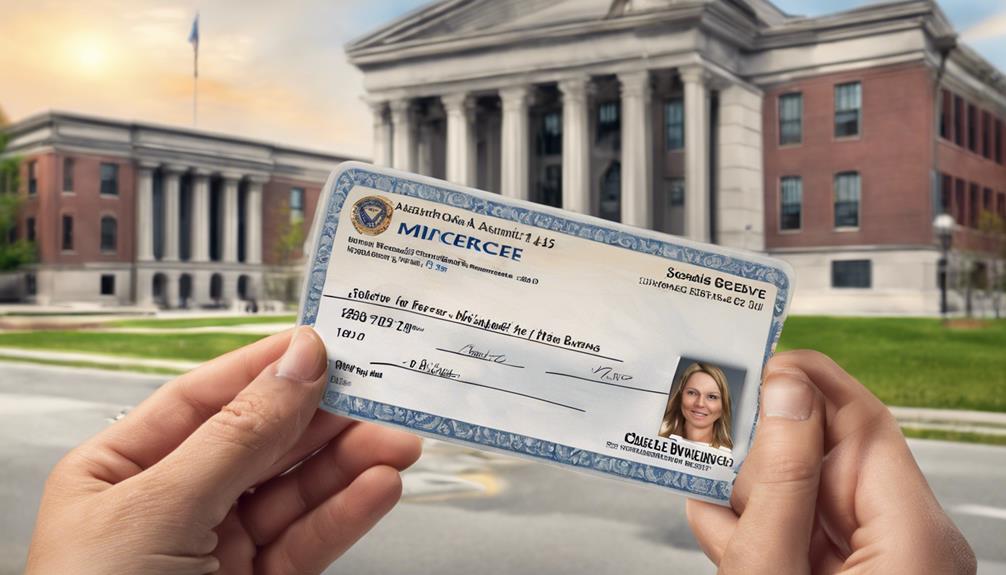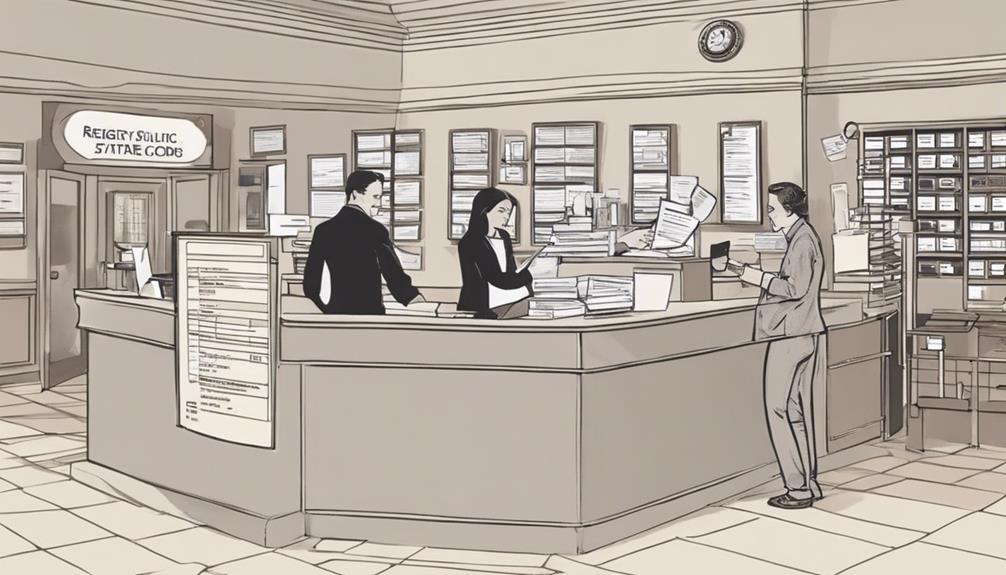In Massachusetts, they say that when you need a copy of your divorce decree, there is always a way.
Getting your hands on this crucial document involves navigating through specific steps and requirements. From contacting the Probate and Family Court locations to exploring online resources, the process may seem daunting at first, but with the right guidance, you can successfully secure your divorce decree.
Let's explore the avenues available to us in uncovering this vital information.
Key Takeaways
- Contact the specific Probate Court where your case was filed for the divorce decree.
- Fill out the Certificate of Divorce Absolute form with court name and docket number.
- Reach out to the Registry of Vital Records and Statistics for guidance on obtaining the decree.
- Prepare accurate details and payment promptly to expedite the process.
Probate and Family Court Locations
To locate the nearest Probate and Family Court for obtaining a copy of your divorce decree in Massachusetts, you can utilize the search feature on masscourts.org or contact the specific court where your divorce case was filed.
Massachusetts houses 14 Probate and Family Court locations where individuals can request copies of their divorce decrees. These courts serve as vital institutions within the Massachusetts Trial Court system, specializing in matters related to divorce, child custody, and family law.
Whether your divorce case was filed in Boston, Worcester, Springfield, or any other county in Massachusetts, reaching out to the respective Probate Court is the initial step towards obtaining a copy of your divorce decree.
Additionally, the Probate & Family Court Virtual Registry offers a convenient platform for accessing case details and requesting necessary documents. Providing accurate information regarding your divorce case when interacting with court staff can significantly expedite the process of obtaining the required copy of your divorce decree.
Required Documents and Fees

Navigating the process of obtaining a copy of your divorce decree in Massachusetts requires having the necessary documents and being aware of the associated fees. To successfully request your Massachusetts divorce decree, you will need the docket number and court name where the divorce was finalized. It is essential to fill out the form for a Certificate of Divorce Absolute to initiate the request process. Contact the Registry of Vital Records and Statistics for guidance on how to obtain your divorce decree. Fees for obtaining your divorce decree may vary depending on the document type and the number of copies requested. To expedite the process, ensure you provide accurate details and payment promptly.
| Required Documents | Associated Fees |
|---|---|
| Docket number and court name | Varies based on document type |
| Certificate of Divorce Absolute | Additional copies requested |
| Separation agreement |
Requesting Your Divorce Decree
When requesting your divorce decree in Massachusetts, the initial step involves providing the court name and docket number. This information is crucial to ensure the accurate retrieval of your divorce decree.
To expedite the process, consider the following:
- Fill out the form for a Certificate of Divorce Absolute: This form is essential for officially requesting your divorce decree from the court where the divorce was finalized.
- Contact the Registry of Vital Records and Statistics: The Registry of Vital Records and Statistics is your primary point of contact for obtaining your divorce decree. They can provide guidance and assistance throughout the process.
- Ensure you have the necessary information: Having the court name and docket number ready will help streamline the request process and avoid delays.
Registry of Vital Records and Statistics

The Registry of Vital Records and Statistics in Massachusetts plays a vital role in handling requests for divorce decrees. When seeking a copy of your divorce decree, it's essential to contact this office for assistance. They can provide valuable information on the process and requirements necessary to obtain your divorce record.
To request your divorce decree, you'll need to fill out a form for a Certificate of Divorce Absolute. This form typically requires details such as the court name and docket number related to your divorce proceedings. The Massachusetts Trial Court oversees divorce records, and the Registry of Vital Records and Statistics is your point of contact for accessing these documents.
Retrieving Divorce Records Online
For those seeking to access divorce records online in Massachusetts, the current system doesn't offer this option at the moment. If you need a copy of your divorce decree, you'll typically have to contact the Massachusetts Trial Court where the divorce was finalized.
Here are some important steps to consider when retrieving your divorce records:
- Submit a request form: You may need to fill out a specific form to request a copy of your divorce decree.
- Provide case details: Be prepared to offer information such as the docket number, court name, and relevant personal data to help locate your court record.
- Contact court staff: Reach out to court personnel for guidance on how to obtain a copy of your divorce decree, whether through in-person visits, mail requests, or other approved methods.
Frequently Asked Questions
Are Divorce Decrees Public Record in Massachusetts?
Yes, divorce decrees are public records in Massachusetts. They are accessible to the public for viewing and obtaining copies. These records contain crucial details about the divorce terms, aiding individuals in post-divorce matters.
Are Family Court Records Public in Massachusetts?
Yes, family court records in Massachusetts are generally public, indexed by county and year. Post-2000 records may be restricted for privacy. We can guide you on accessing these records, ensuring compliance with any restrictions.
What Is Divorce Absolute in Massachusetts?
Divorce Absolute in Massachusetts finalizes a marriage termination, a vital legal proof often needed for remarriage. It is crucial for complying with state laws and keeping legal matters in order.
How Do I Get a Copy of My Custody Papers in Massachusetts?
We contact the probate and family court where our case was filed to obtain a copy of our custody papers. Details such as case number and parties' names are crucial for a smooth retrieval process. Keeping custody papers is essential for co-parenting situations.
Can I Obtain a Copy of My Divorce Decree in Massachusetts if I Want to Get Married Again?
Yes, you can obtain a copy of your divorce decree in Massachusetts if you want to get married again. The process typically involves submitting a request to the county courthouse where the divorce was finalized. It’s an important stepbystep marriage after divorce in order to ensure your legal status for a new marriage.
Conclusion
In conclusion, whether you visit a Probate and Family Court location, search online, or contact the Virtual Registry, obtaining a copy of your divorce decree in Massachusetts is a straightforward process.
By following the required steps, providing the necessary information, and paying the appropriate fees, you can easily retrieve your divorce records.
Remember, the Registry of Vital Records and Statistics is also available to assist you with any additional support you may need.










